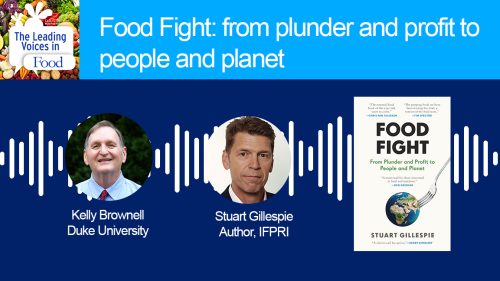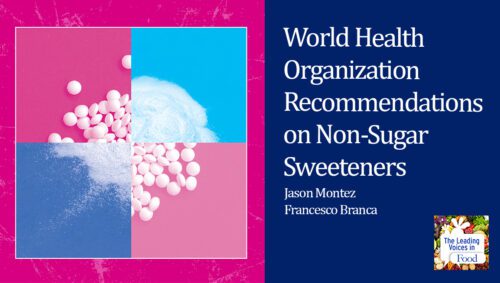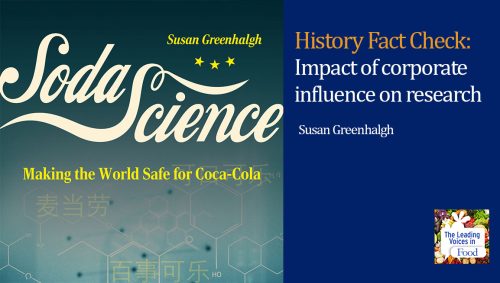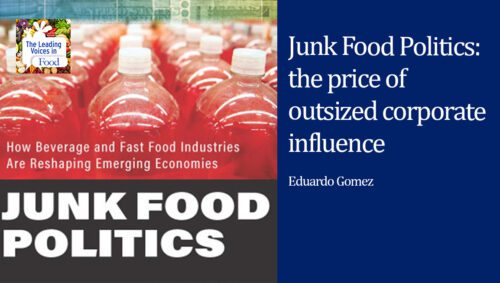E44: Chile’s Health Strategy: Warning Labels, Soda Taxes, and Marketing Limits
So what happens when a country gets really serious…REALLY serious about tackling diet, nutrition, and chronic disease? Is there a country in the world that stands out for taking the most imaginative and strongest action? The answer is yes, and a person who knows a lot about this is our guest Barry Popkin.
Subscribe: Apple Podcasts | TuneIN | YouTube Music | SoundCloud | PocketCasts | Radio Public
Tags: Childhood Obesity | Food Industry Behavior & Marketing | International Food & Ag Policy | Obesity | Soda Taxes |

Barry Popkin is the W.R. Kenan Jr. Distinguished professor in the Department of Nutrition at the University of North Carolina-Gillings School of Public Health. Barry is a leading expert on taxes on sugar sweetened beverages and dietary changes around the world. He has been heavily engaged with the country I mentioned, and that country is Chile.
Interview Summary
What has happened in Chile has been impressive in scope and impact. Before we speak about what has been done specifically, can you explain please? What’s made it possible for Chile to take action and in such impressive ways?
Is it a combination. There was a legislator, senator by the name of Gerardi. A physician who had been a leader on environmental change and he created a coalition of senators and Congress and Congressmen that together were very interested in improving the health of Chile. Chile had an obesity level close to ours, and was the highest sugar beverage consuming country in the world. This was after the Mexican tax reduced Mexican sugary beverage consumption and child obesity was skyrocketing. And Chile has a government health program. So Gerardi pulled this coalition together and at the same time they had a set up scholars from the institute of Nutrition and Food Technology at the University of Chile that got together and worked with this group. And then they had a minister of health who then subsequently became the president by the name Michelle Bachelet.
And she was a pediatrician. That combination of a passionate Minister of Health who truly believed in dealing with this problem of overweight, a group of academics that helped them, and this congressional coalition, without a major advocacy campaign, unlike any other country in the world, just essentially decided to do it. And they created the set of policies with what would be unusual kind of unanimity among the congressional groups and the president. And this is Bachelet. And they passed these laws that when a conservative government came in, which is in the last two years, they were kind of forced to retain because they had become popular. They were having a big impact and they could see it in healthcare issues and other things.
Well is that impressive! And it’s a really great example, isn’t it, of how scientists and the people in elected offices and the public policy leaders can work together. So let me ask a particular question on what they’ve done around front of the package and labeling. What’s happened with that?
Okay, so Chile is the first country in the world to take what we found in cigarettes is very impactful: warning labels. And they put that warning label on a food that’s high in added sugar, added saturated fat, added sodium, or if it has any additives of any of the above, high in energy. And so they created this system of nutrient profiling that had three phases. The first phase covered about 40% of the packaged foods. We were thinking these have junk food. They kept out of this real food. And they kept out of this certain categories of other healthy foods. So these packaged processed foods that were unhealthy – in the first year about 40% were covered. And then two years later the requirements got tighter. And then in the third or fourth year they got even tighter. And what they found from this warning labels to things, both industry responded by cutting the sodium, cutting the added sugar and making many more products healthy.
And secondly, the public responded very well to this. Low and middle income households were changing their behavior. Now part of the reason is they have these warning labels, which is very important. And that it was linked to two additional policies. If you were in a school, public or private, you could not bring to that school any food or you could not eat it at that school, any food with that warning label. So what that meant was that we found that children were telling their parents – Mom, don’t buy any of these warning label foods! Don’t buy these unhealthy foods! In fact, we have three or four in our focus groups where the young, low income children tell their mothers I want salads for lunch now. So the fact is that was the first thing, linking it to school program. Not only feeding programs in the school. Whatever could be brought in or sold in the school, vending or whatever.
The second thing they started doing was they started a fairly interesting comprehensive marketing law. Now what’s unique about this marketing law was first–if you were a food that was labeled with a warning label, you could not have a character on the package. No more Tony the Tiger, even Santa Claus and Easter Bunny full of chocolate, no more figures of the Santa Claus or the Easter Bunny. So it really impacted consumer behavior and child behavior. But on top of that, for child-oriented TV program, for the first two years they banned these warning label products.
I’d love to hear more about this. So because this is relatively new, has there been time to collect data and really understand them?
Yeah. So we got one paper published and three in press that describe the marketing, the effects in schools, the effects on beverage purchases. Let me first describe the marketing because it’s very interesting. So there’s two kinds of marketing. There is marketing oriented toward children, which really focuses on them and children’s programs. And then there’s general marketing of the product which you see on sports events and regular soap operas and other kinds of TV. What happened was the child oriented marketing went way down and children had less exposure overall but not as much as you would think because all the marketing shifted to the non child-oriented program. So the total amount of marketing with did not change. But the orientation of the marketing became more adult oriented and less child oriented. So there was a slight change in child attitudes but not that much. So subsequently, this last summer, July, two years after the law was implemented, the government instituted a total marketing ban. From 6:00 AM to 10:00 PM, any warning label food cannot be shown on TV. That would mean if you’re at a sporting event and are televising it, you can’t see a Coca Cola product, Coca Cola with sugar in it. And secondly, after 10:00 PM, so between 10:00 PM and 6:00 AM, a warning message is put on any product that is marketed on TV or elsewhere that has the warning label.
This is incredibly comprehensive to think about this suite of things, working together: the marketing, working with labeling, working with the schools, etc. So is there any way of knowing the impact of this in Chile, say compared to a country like Mexico where the tax has been the main thing that’s been done?
Yes. It’s a very interesting difference. Up to that point, we thought tax with the only answer. And in Mexico, at the 10% act, we had that 6% reduction in purchases in the first year and an extra 4% in the second year. In Chile in the first 18 months of this law, we had at 25% reduction in sugary beverage purchases. And that’s just the first year and it will continue to increase. So the fact is that for, and we’ve looked at some food groups, we haven’t looked at all of them yet, but every unhealthy food group, we have seen a major, marked reduction. So not only does it affect the sugary beverages much more, but it affects other things. Now we don’t know if that will be the same in other countries. But this has really then a guidance for other countries. Right now, four or five other countries have adopted, exactly verbatim, the Chile front of the package warning label system.
Peru, Uruguay in Israel all have adopted it. Right now India’s considering it and three or four other countries that haven’t publicized it, put are doing studies and the ministries are going to introduce a similar kind of warning label law. So that that part has been very impactful. And it’s the first front of the package label that we have seen impact purchasing. Up till now there have been positive labels or traffic lights with multiple colors based on if you’re good or bad in a certain nutrients, and to have an impact on purchasing. So this is the first study to do that, which when it all the results are to be published this year will truly change how we begin to understand ways that we can impact consumer behavior. And manufacturing because the manufacturers are formulating. They have the technology to get rid of sodium, but it takes a regulation like Chile to do it.
Do you see any possibility that Chile might use taxes as the strategy layered on to these other things? And if so, do you think there will be incremental benefit?
Yes they will they will do that. They will see an incremental benefit on top of this. Their goal is to get rid of much of this unhealthy food as they can and shift people toward truly healthier food.
So Barry, how in the world have the authorities Chile been able to prevail over what I imagine are pretty strong interest in the food industry?
It’s this coalition of the congressman and this high cost of healthcare. And in a government that has a public healthcare system–so the government’s paying for it, which is one of the reasons why a number of other Latin American countries are truly going after regulations and taxes and other things, is because they’re paying for healthcare for everybody. So the government feels the costs directly.













